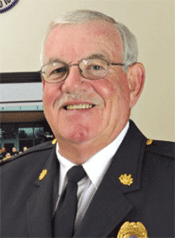 The law enforcement profession attracts a special kind of person. As police chiefs, we have the privilege of working with some of the finest individuals in the world—individuals who have at their foundation a set of core values that reflect the nature of our profession: values such as service, dignity and respect for others, honor, integrity, courage, loyalty, and duty. Our officers have voluntarily chosen a profession whose very nature places them in harm’s way. When others flee from the sound of gunfire and the threat of violence, it is a police officer’s duty to run toward it.
The law enforcement profession attracts a special kind of person. As police chiefs, we have the privilege of working with some of the finest individuals in the world—individuals who have at their foundation a set of core values that reflect the nature of our profession: values such as service, dignity and respect for others, honor, integrity, courage, loyalty, and duty. Our officers have voluntarily chosen a profession whose very nature places them in harm’s way. When others flee from the sound of gunfire and the threat of violence, it is a police officer’s duty to run toward it.
Given the character of these brave men and women, it should come as no surprise that a significant number of our officers also serve their communities and their nation by serving in the National Guard and the reserves. They train to respond to their communities and their country in times of crisis and natural disasters and are often called to active duty for prolonged periods of time with little advance notice.
In the United States, 1.1 million men and women have joined the National Guard and the reserves. Many are serving in overseas operations in Iraq and Afghanistan. Notably, more than 23 percent of law enforcement agencies in the United States have had officers called to active duty since the 9/11 attacks.
These men and women deserve our support, admiration, and respect. By volunteering to serve, they once again have placed the needs of the community above their own. I truly believe that they are heroes in every sense of the word.
However, in addition to our admiration and respect, these brave men and women also need our assurance that their livelihoods at home are safe. To that end, in 1994 the U.S. Congress enacted the Uniformed Services Employment and Reemployment Rights Act of 1994 (USERRA) to ensure fair treatment of returning members of the National Guard and the reserves.
For those unfamiliar with USERRA, the law is intended to ensure that persons who serve or have served in the armed forces, the reserves, the National Guard, or other “uniformed services” are
- not disadvantaged in their civilian careers because of their service;
- promptly reemployed in their civilian jobs upon their return from duty; and
- not discriminated against in employment based on past, present, or future military service.
Yet despite the law, many in the National Guard and the reserves are often unclear about their employers’ views of their service and the impact it might have on their professional careers. They need and deserve a clear statement of our support for their sacrifices on our behalf.
To that end, I am proud to announce that this month I had the privilege of signing a statement of the IACP’s support for the National Guard and the reserves. This Statement of Support, which was sponsored by the Department of Defense’s Employer Support of Guard and Reserve (ESGR) program, commits the IACP to the following:
- Fully recognize, honor, and enforce the USERRA
- Ensure that our managers and supervisors have the tools needed to effectively manage those employees who serve in the National Guard and the reserves
- Continually recognize and support those who serve in the National Guard and the reserves
ESGR initiated the Statement of Support program in 1972. Since that time, every U.S. president, all 50 state governors, leaders of major business and employer associations, Fortune 500 companies, and employers in the hundreds of thousands have demonstrated their commitment to their employees by signing a Statement of Support.
Through the Statement of Support and its other efforts, the ESGR program seeks to promote a culture in which all employers support and value the military service of their employees. It recognizes outstanding support, increases awareness of the law, and resolves conflicts through mediation. Its role is to ensure that the transition from civilian employee to active military duty and then back to civilian life is as smooth as possible.
Now more than ever, active support of law enforcement employees who voluntarily participate in their community-based defense force is vitally important.
That is why I am challenging all police chiefs and law enforcement executives to publicly demonstrate support for their officers and civilian employees who serve in the National Guard and the reserves by signing a Statement of Support on behalf of your agency.
Through their actions and selfless devotion, these officers have earned our respect and that of their fellow citizens, and they need and deserve our support.
To request a Statement of Support for your agency, please call 800-336-4590 or visit the ESGRWeb site at www.esgr.mil.
Please cite as:
Michael J. Carroll, “A Sign of Support for Officers Who Serve in the Military,” President’s Message:The Police Chief 77 (March 2010): 6.


